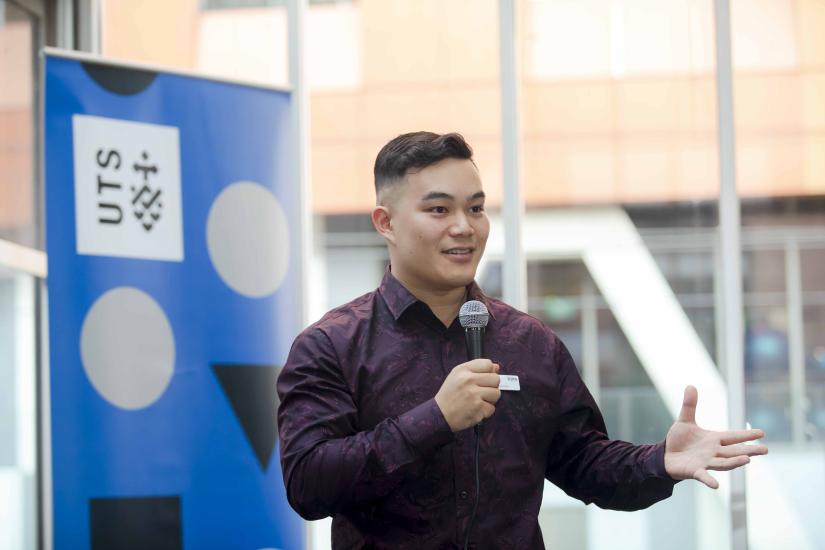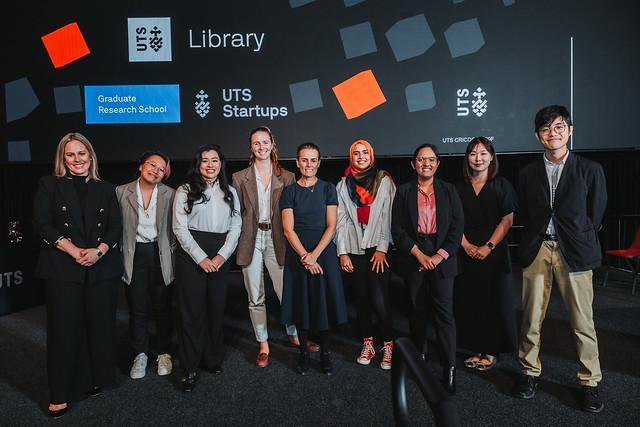In a recent pitching workshop in the lead up to the UTS Three Minute Thesis Competition, trainer Aaron Ngan shared invaluable insights specifically for academic researchers. These suggestions, drawn from Aaron’s years of experience in public speaking and coaching, will help you effectively communicate your research and engage an audience.
Mastering the art of pitching

Aaron Ngan speaking at a UTS event
Talk about your work
There is huge value in engaging in as many conversations about your research that you can. Aaron suggests you talk to all kinds of people – family, friends and other researchers - and tune in to what it is they find the most interesting about your story.
“Talk about your work with enthusiasm. Why is it important? Who will be affected by it?” he asked. “Listen carefully to the questions people ask you.”
Aaron said that every reaction you notice is valuable feedback. You can use these responses and questions to refine your pitch and make sure it addresses the areas that pique the most interest.
Talk about your work with enthusiasm. Why is it important? Who will be affected by it?
He added that talking out loud is crucial for not only refining your pitch, but also for becoming comfortable with how you discuss your research with people who may know very little about your topic.
Structure your pitch
Aaron suggests a simple structure to help you organise your thoughts:
- Problem: What is the problem you working on?
- Impact: What is the impact of the problem? And who is impacted?
- Progress / Challenges: Talk about what you have been doing and share information about the challenges you are grappling with.
- Future Outcome: Outline the big picture benefit of your research.
“Do not memorise a script. Instead, practice talking to people,” he said.
“The more you practice talking about your research, the higher the chances that your pitch delivery will be interesting, natural and confident.”
Top preparation tips
- Practice speaking aloud: Stand up and practice your pitch out loud, ideally in front of an audience. If you don't have an audience, record yourself. This will help you get used to the sound of your own voice and the flow of your words.
- Embrace imperfection: In your practice sessions, don’t worry about making mistakes. Instead, get comfortable with your story and the act of sharing it with enthusiasm and passion, rather than aiming for perfection.
- Keep going: When you are pitching, if you make a mistake, do not stop and then restart from the beginning. If you stop every time, you practice “restarting”. Keep going! Each repetition gives your brain more practice speaking through moments of uncertainty.
- Connect with your audience: You need to understand and address what are the audience's interests and concerns. What do they care about most? The best way to know is to pay attention to the questions people ask you.
- Anticipate questions: Think about potential questions that might arise during your pitch. Prepare concise and clear responses to these questions.
Your first few practice sessions are likely to be messy. But as you get the words out and refine your pitch, you’ll get better over time.
In my experience, the strongest and most impactful pitches don’t just present information; they tell a powerful story that resonates with an audience, excites them and inspires action.
Aaron believes that all academic researchers have the potential to deliver compelling and impactful pitches, and this starts by having as many everyday conversations as possible.
"In my experience, the strongest and most impactful pitches don’t just present information; they tell a powerful story that resonates with an audience, excites them and inspires action,” Aaron said.
Attend the 3MT finals!

Three Minute Thesis (3MT) is an exciting opportunity for research students to showcase their work and develop their communication and presentation skills. Learn more.
The UTS finals will take place in the Great Hall on 3 September 2025. Invitations will be issued soon, so please check the What’s On page to claim your spot.
Aaron will be leading a communication course for UTS HDR students later this month. Find details and enrol in the Effective Speaker Series starting 26 August at the HDR website Research Futures